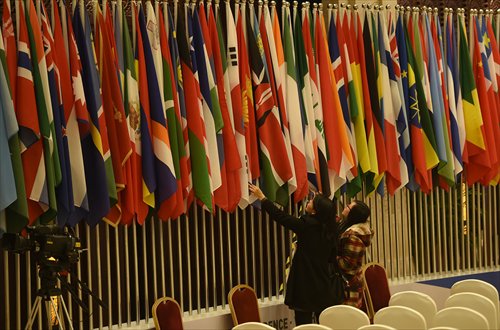China eyes cyber influence
Internet sovereignty bone of contention: observers

Workers arrange the flags at a conference room of the World Internet Conference in Wuzhen, Zhejiang Province on Monday. More than 2,000 delegates from over 120 countries and regions will participate in the three-day event. Photo: Xinhua
China will uphold the "opening-up and development" principle as it moves from a country with a large netizen population to a world Internet power, an official in charge of the country's Internet administration said Tuesday in Wuzhen ahead of the World Internet Conference.
"China's door will never be shut," Lu Wei, head of the Cyberspace Administration of China, said during the opening ceremony of the expo, "The Light of Internet," in Wuzhen, Zhejiang Province, which served as a prelude to the Internet conference scheduled from Wednesday to Friday.
Lu said that he could feel China is striding forward toward becoming a major Internet power as a result of China's reform and opening-up policy as well as effective management in accordance with the law.
"We will actively participate in international exchanges and cooperation on Internet affairs, and learn from the experiences and technological advances of other countries … and push for the opening-up and cooperation of cyberspace to achieve mutual benefit," Lu said.
Chinese President Xi Jinping will for the first time deliver a keynote speech at the opening ceremony of the conference on Wednesday.
Russian Prime Minister Dmitry Medvedev will also speak at the ceremony.
In an address to the first conference of the country's Central Leading Group on Cyberspace Affairs, Xi said that the government aims to build China into a "strong Internet power."
Leaders of eight countries and more than 2,000 delegates from over 120 countries and regions will participate in the conference in the East China city.
Senior officials from the United Nations and executives from Apple, Microsoft, Nokia, Lenovo, Alibaba, Baidu and Tencent will also participate in this year's conference with the theme, "An Interconnected World Shared and Governed by All - Building a Community of a Common Future in Cyberspace."
Scholars, officials and businessmen will attend a forum on "Internet Plus" on Wednesday afternoon to discuss the prospects of China's financial reform and financial markets.
Other forums include one where Internet giants, including Jack Ma of Alibaba, will discuss the prospects of Sino-US exchanges in cyberspace and supervision over the mobile Internet industry.
Among the expo's exhibits are the cutting-edge driverless car from Baidu and independent aerostat technology of the China Electronics Technology Group Corporation.
Lu said that the inclusiveness and vitality of China's Internet industry have improved people's lives, and also shows the huge potentials in the industry.
He added that China's Internet industry will be driven by innovation, coordination, opening-up, sharing and green development.
"The conference is significant to China as it will bring more global visions, and will likewise showcase China's rising status and strength in the Internet industry," Fang Xingdong, founder of chinalabs.com, told the Global Times.
Cyber governance
Meanwhile, analysts said that talks between China and the West on cyber management and sovereignty may also continue during and after the conference, but added that the meeting could help bridge the gap between the two sides.
"The world used to be against China's Internet governance. We hope to present our ideas and policies in the conference and gain more understanding. We want to show the world a responsible major Internet power which is also a key world power in using and safeguarding cyberspace," Internet Society of China chairman Wu Hequan said in an interview with The Beijing News.
As of June, China had an online population of 668 million, according to official data. Four of the world's top 10 Internet companies are from China.
Ranking second in world Internet power, China not only boasts of its achievements but more importantly shoulders greater responsibility as it offers more innovative ideas and vitality to global Internet governance, according to Fang.
"No single government can control the Internet. If our government watches over everything, how could there be a boom in Internet companies and netizens?" Fang said, adding that official supervision has also contributed to the industry's prosperity.
"China is seeking a consensus on global Internet governance, and what China has achieved can serve as a model for other developing countries," said Qin An, a cyber-security expert from the China Institute for Innovation and Development Strategy.